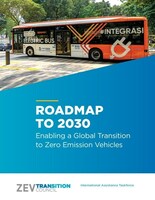Today at COP28 in Dubai, the Zero Emission Vehicles Transition Council (ZEVTC) launched the Global ZEV Transition Roadmap, setting out for the first time in any global sector a holistic package of actions to systematically strengthen international support for emerging markets and developing economies (EMDEs) this decade.
DUBAI, UAE, Dec. 5, 2023 /PRNewswire-PRWeb/ -- Today the Zero Emission Vehicles Transition Council (ZEVTC) launched the Global ZEV Transition Roadmap, setting out for the first time in any global sector a holistic package of actions to systematically strengthen international support for emerging markets and developing economies (EMDEs) this decade.
Announced during a high-level event co-hosted by the United Kingdom, FIA Foundation, and International Council on Clean Transportation, the Roadmap – a key action under the Road Transport Breakthrough – articulates how governments and international partners will collectively grow and target catalytic change across the road transport sector.
Informed heavily by the Breakthrough Agenda's recommendations and the ambition of the COP27 Global Commitment that was launched by several ZEVTC member governments, the Roadmap is the first of an annual publication coinciding with subsequent COPs through to 2030.
It has been developed by the world-leading experts and initiatives of the ZEVTC's International Assistance Taskforce (IAT) and extensively shaped by the unique experiences of many types of EMDEs throughout the work of the ZEVTC and partners over the last several years.
Through addressing an initial set of five urgent strategic challenges, the Roadmap aims to reverse the current trajectory that predicts many countries will be left behind in the ZEV transition, and strives to avoid a multi-tiered global auto market becoming entrenched this decade.
These five strategic challenges include:
- Building capacity across EMDEs to develop and implement policy action;
- Improving access to and scaling finance;
- Increasing the availability of ZEVs in EMDEs;
- Accelerating charging infrastructure roll-out; and
- Lifecycle management of ZEVs, electric vehicles, and battery components.
Examples of actions under these strategic challenges include launching a new Country Cluster Initiative and Twinning Programme to help countries design and implement robust e-mobility policy frameworks; scaling the ZEV Rapid Response Facility (ZEV-RRF), Global Facility to Decarbonize Transport and the ZEV Emerging Markets Initiative to provide more countries with greater amount of support; and collaborating with the Collective for Clean Transport Finance to launch a new Global Electric Bus Aggregation Framework to scale deployment across regions and work to replicate this in other vehicles segments.
Also, at the COP28 event, US$400,000 of new seed funding from the Drive Electric Campaign was announced for the ZEV-RRF to enable it to provide even more bespoke support to EMDEs. Alongside this, the ZEV-RRF's recipient country list will now be expanded to include signatories of the Global Memorandum of Understanding on Zero-emission Medium- and Heavy-Duty Vehicles.
"As co-chair of the Zero Emission Vehicle Transition Council along with our partners in the UK, it's an honor to work together with every ZEVTC member to accelerate the transition to a clean transportation future," said United States Environmental Protection Agency Administrator Michael S. Regan. "Moving quickly toward a zero-emission vehicle future will be key to improving air quality, reducing the impacts of climate change, and boosting our economies, Today's action is an important step forward in these efforts and will help ensure those who have historically been left behind benefit equally from the historic climate solutions and opportunities ahead."
"Through this Roadmap we are setting out for the first time a coordinated plan to support developing countries to transition to zero-emission vehicles," said The Rt Hon Graham Stuart MP, Minister of State for Energy Security and Net Zero of the United Kingdom. "This is vital if we are to keep 1.5°C within reach, but also essential for improving air quality, reducing oil consumption and ensuring no country is left behind in the ZEV transition. Now we need to get on and implement these bold and ambitious plans without delay."
About the Zero Emission Vehicles Transition Council:
The Zero Emission Vehicles Transition Council (ZEVTC) was formed in November 2020 as the world's first strategic forum through which ministers and government representatives from some of the world's largest and most progressive automotive markets – collectively accounting for more than half of all new car sales globally – meet to collaborate to accelerate the pace of the global transition to zero-emission vehicles. The International Council on Clean Transportation serves as secretariat.
Media Contact
Sarina Katz, International Council on Clean Transportation, 1 6107152782, [email protected], www.zevtc.org
SOURCE Zero Emission Vehicles Transition Council


Share this article